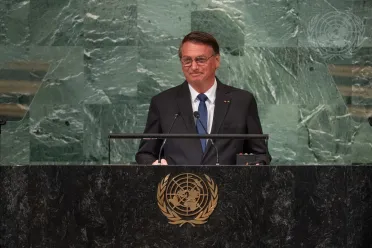Statement
Statement summary
JAIR MESSIAS BOLSONARO, President of Brazil, noted that, during the COVID-19 pandemic, his Government made all the efforts to save lives and preserve jobs. To this end, it launched a broad vaccination programme, including domestic production of vaccines. “In my administration, we uprooted the systemic corruption that existed in the country,” he asserted, pointing to the implementation of a comprehensive agenda of privatizations and concessions, with an emphasis on infrastructure. Citing efforts to modernize the Brazilian economy, he reported that his country concluded the São Francisco River transposition project, bringing water to the Brazilian north-east and further adopted new regulatory frameworks, addressing basic sanitation, railroads and natural gas. “Despite international pressures, Brazil is getting to the end of 2022 with an economy in full recovery,” he said, noting that poverty in his country began to fall sharply. In 2021, Brazil was the fourth largest destination for foreign direct investment in the world.
Four decades ago, Brazil used to import food; today, it is one of the world's largest exporters. This was only possible thanks to heavy investments in science and innovation, he underscored, honouring Alysson Paolinelli, Brazilian candidate for the Nobel Peace Prize, for his role in expanding Brazil’s agricultural frontier with the use of new technologies. With regards to sustainable development, he reported that two thirds of the Brazilian territory remain covered by native vegetation that is found exactly as it was when Brazil was discovered in 1500.
In the Brazilian Amazon, more than 80 per cent of the forest remains untouched, contrary to what is reported by the mainstream national and international media, he stressed, adding that the Amazon region is home to more than 20 million inhabitants, including indigenous and riverside dwellers, whose livelihood depends on some economic use of the forest. The Government brought internet connection to more than 11,000 rural schools and to more than 500 indigenous communities.
Last year, Brazil was announced by the United Nations as the “global champion for energy transition”, he continued, spotlighting his country’s potential to become a major global exporter of clean energy. Warning against threats to international peace and security, he pointed to Brazil’s extensive history of participation in United Nations peacekeeping operations. To Venezuelan refugee and migrant crisis, Brazil responded with the “Operation Welcome” and provided territory, emergency assistance and protection to more than 350,000 Venezuelans. The Brazilian humanitarian reception policy goes beyond Venezuela as Brazil has also received Haitians, Syrians, Afghans and Ukrainians.
Turning to the conflict in Ukraine, he called for immediate ceasefire, the protection of civilians and non-combatants, the preservation of critical infrastructure, and the maintenance of all channels of dialogue between the parties in conflict. “We are against diplomatic and economic isolation,” he said, cautioning against unilateral and selective sanctions that are inconsistent with international law. These measures have harmed the economic recovery and threatened human rights of vulnerable populations, including in European countries, he asserted.
Full statement
Read the full statement, in PDF format.
Photo

Previous sessions
Access the statements from previous sessions.
